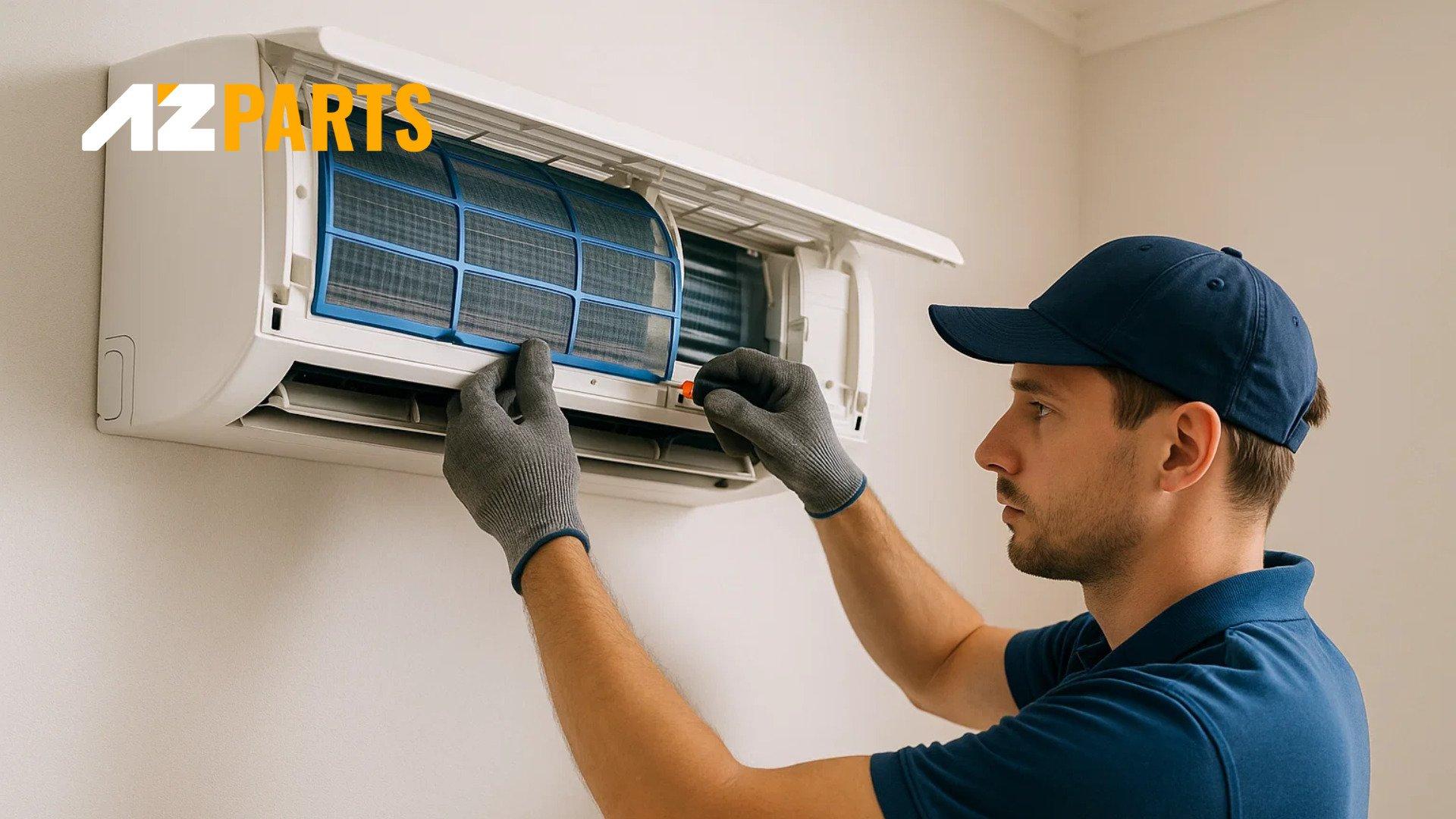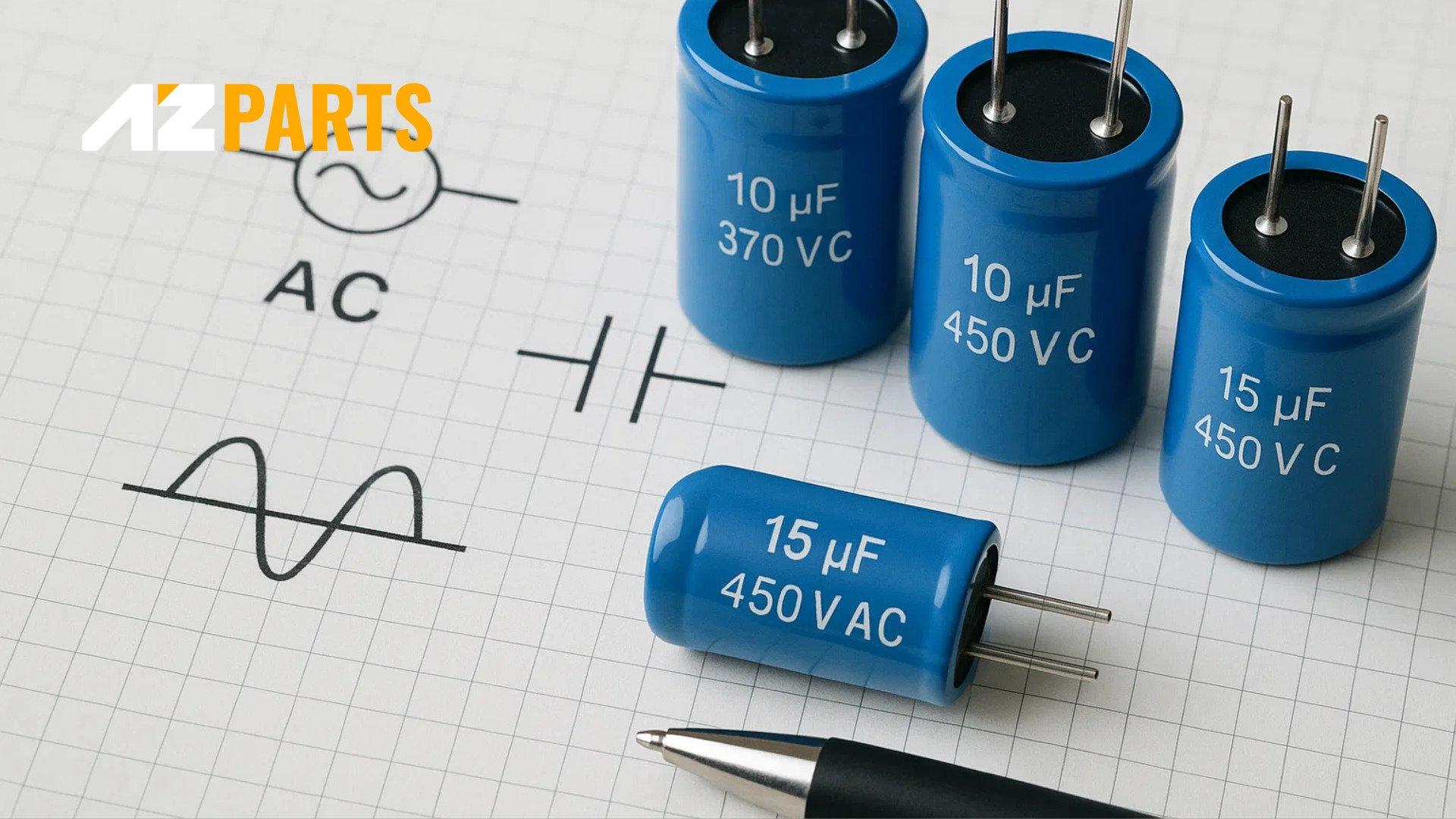Review
How Long Does an AC Capacitor Typically Last at Home?
AZparts Team
Updated on June 18, 2025
9 min read
If you’ve ever asked, how long does an air conditioner capacitor last, you’re not alone. This small but essential HVAC component plays a major role in keeping your system running smoothly. In this article, let’s explore the typical lifespan of an AC capacitor, how to spot signs of failure, and what you can do to extend its performance. Join AZParts to understand your HVAC system better and keep it working efficiently for years to come.

1. What Is the Typical Lifespan of an AC Capacitor in Home HVAC Systems?
The AC capacitor lifespan typically ranges from five to ten years. This depends on system usage, local climate, and how well the HVAC unit is maintained. A clean and well-ventilated system helps improve HVAC capacitor durability. In contrast, frequent cycling, power surges, and excess heat can shorten the average capacitor life.
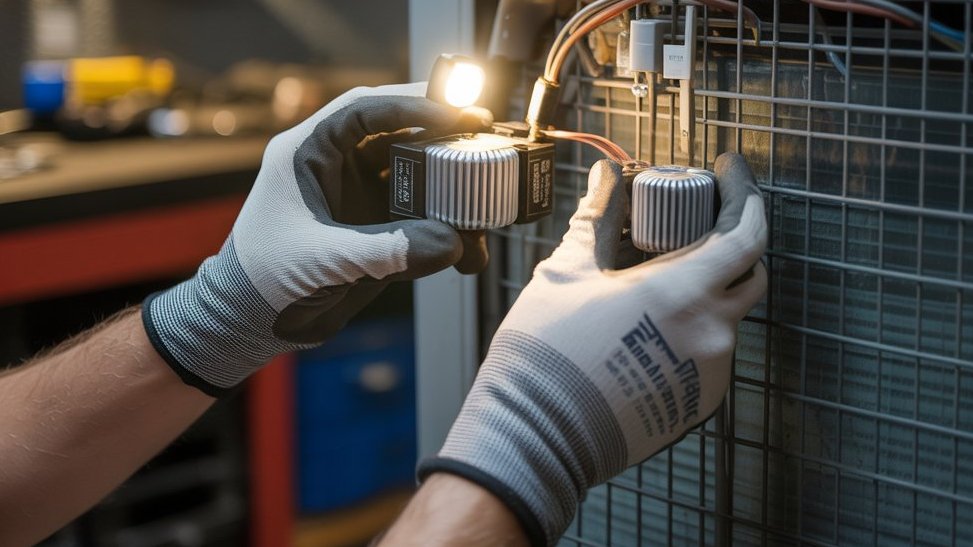
The AC capacitor lifespan typically ranges from five to ten years (Source: AZParts)
2. What Factors Influence How Long an AC Capacitor Will Last?
Several key factors affect the AC capacitor life and overall HVAC component lifespan. From environmental conditions to installation quality, each element plays a role in how long a capacitor will perform reliably. Understanding these factors affecting AC capacitor life can help homeowners take steps to reduce capacitor wear and tear and avoid premature capacitor failure causes.
2.1. How Do Heat and Humidity Affect AC Capacitor Performance?
High temperatures and excess humidity significantly impact capacitor durability. The effect of heat on capacitors includes accelerated internal degradation, especially in outdoor units with poor ventilation. At the same time, humidity can damage HVAC parts by introducing moisture into electrical components. Over time, this temperature impact on AC components reduces efficiency and increases the risk of failure.
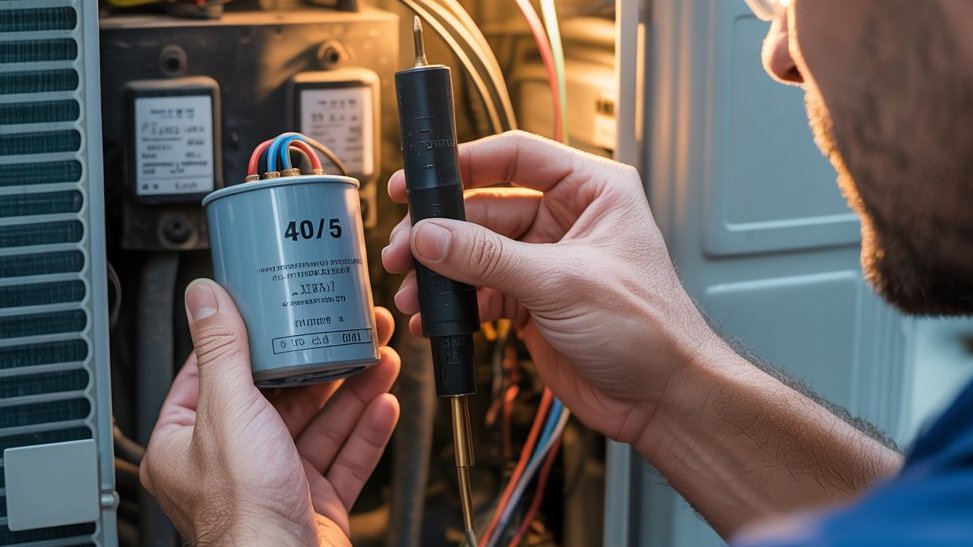
High temperatures and excess humidity significantly impact capacitor durability (Source: AZParts)
2.2. How Does Frequency of AC Use Impact Capacitor Life?
The more often an air conditioner runs, the harder the capacitor has to work. Frequent use increases compressor workload and adds stress to the system. Over time, this wears down internal components. Irregular cycling or long HVAC operating hours also lead to a shortened lifespan. Homeowners should be aware of their AC usage patterns, especially during peak cooling seasons.
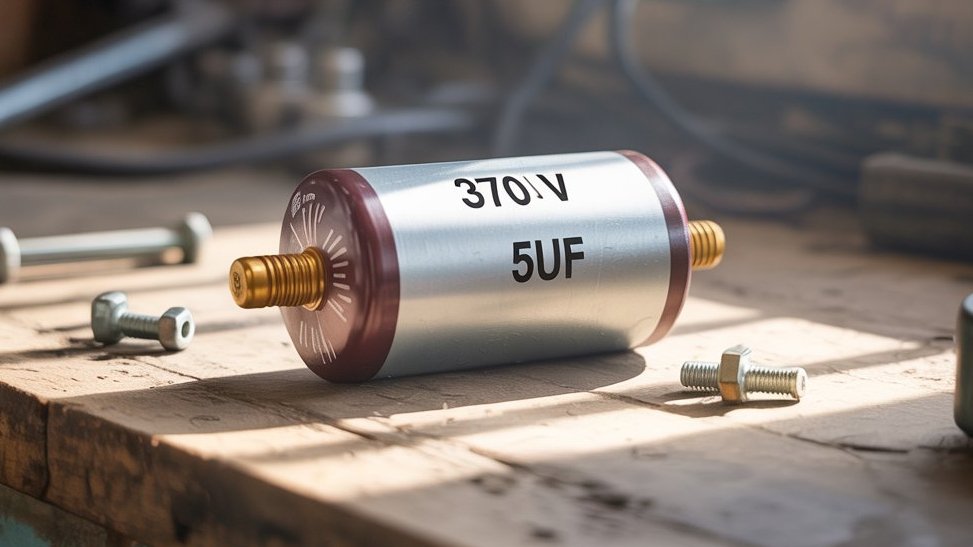
Frequent use increases compressor workload and adds stress to the system (Source: AZParts)
2.3. Why Does the Quality of the AC Unit and Installation Matter?
The build quality of the AC unit directly influences how long its capacitor will last. Systems with better engineering are less prone to overheating or component failure. Proper setup is also critical. Professional installation ensures that all parts, including the capacitor, are correctly sized and connected. Poor workmanship increases installation risks on capacitor lifespan, while high AC system quality and expert service help extend it.
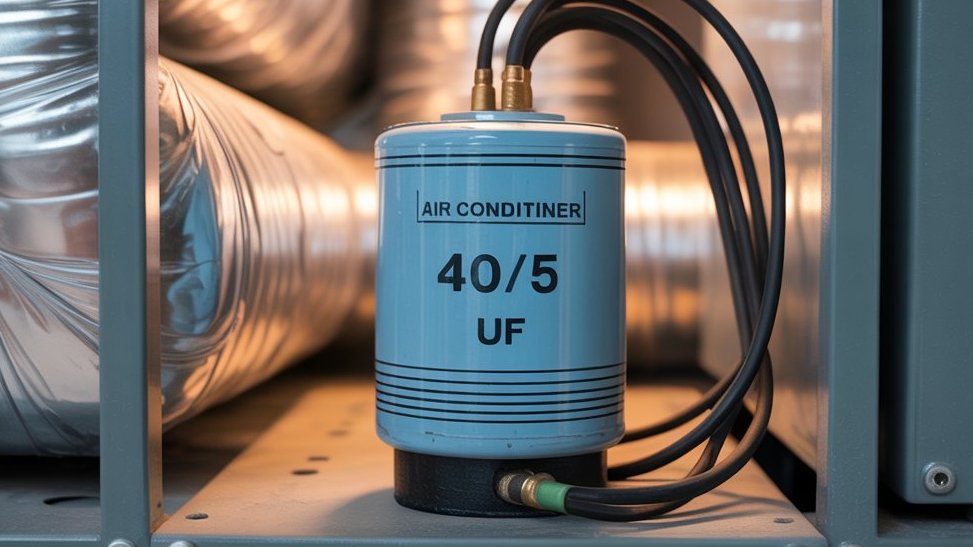
The high AC system quality and expert service help extend life span of the capacitor (Source: AZParts)
3. What Are the Common Signs That Indicate It’s Time to Replace Your AC Capacitor?
Knowing the signs of capacitor failure helps you detect problems early and avoid sudden system breakdowns. A weak or faulty capacitor can cause your air conditioner to lose efficiency or stop working entirely. These are the most common bad AC capacitor symptoms you should watch for:
- Your air conditioner takes longer than usual to start, which is a typical sign of capacitor failure.
- The system blows warm air even when the thermostat is set to cool, showing the capacitor may not power the compressor properly.
- You hear frequent clicking or humming noises from the outdoor unit, which often signals AC troubleshooting capacitor issues.
- The AC cycles on and off too often without completing a full cooling cycle, which suggests the capacitor cannot hold a steady charge.
- The outdoor capacitor looks swollen or is leaking oil, which are visible bad AC capacitor symptoms of internal damage.
- Your energy bills increase unexpectedly even though your usage remains the same, meaning the system is overworking due to a weak capacitor.
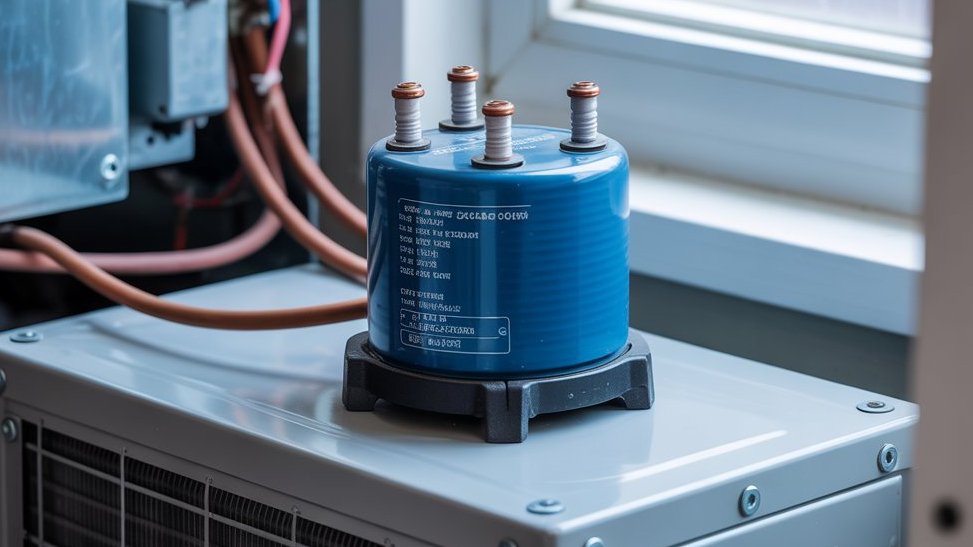
If you notice any of these warning signs, it is time to have your system inspected (Source: AZParts)
4. How Can You Extend the Lifespan of Your AC Capacitor?
To keep your air conditioning system running efficiently, it’s important to take steps that prolong AC capacitor life. Although capacitors have a limited lifespan, proper care can significantly delay wear and reduce the risk of early failure.
- Schedule professional HVAC inspections at least once a year. A technician can test your capacitor, check voltage levels, and spot early signs of wear.
- Keep the outdoor unit clean and free from obstructions. This prevents overheating and reduces the risk of damage from debris or trapped heat.
- Replace your air filters every one to three months. Clean filters reduce system strain and help maintain consistent airflow across components.
- Use a surge protector to guard against power spikes. Sudden voltage surges can severely damage internal circuits, including the capacitor.
- Make sure your thermostat is functioning accurately. A faulty thermostat may cause short cycling, which puts extra stress on the capacitor.
- Check that your system has proper ventilation and airflow. Poor ventilation leads to excess heat, which shortens the lifespan of HVAC parts.
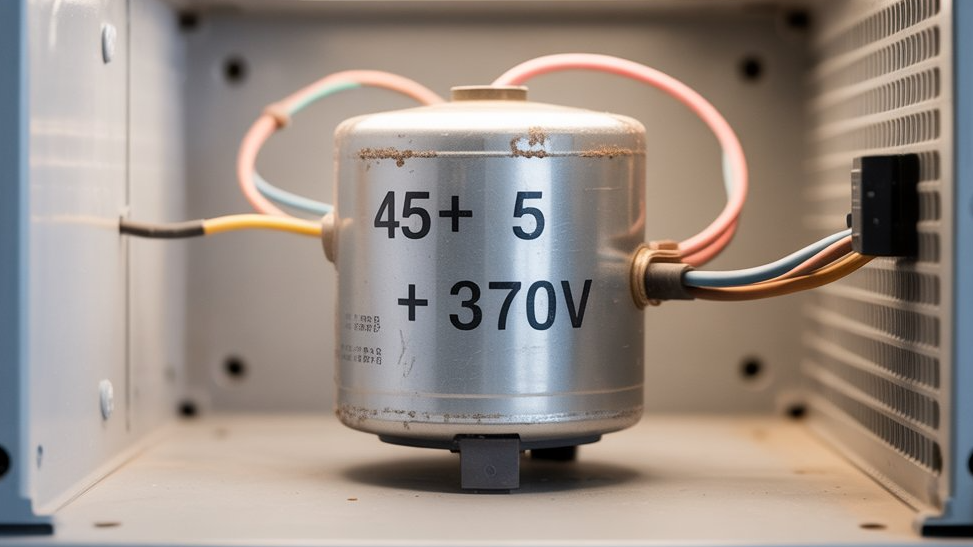
The proper care can significantly delay wear and reduce the risk of early failure (Source: AZParts)
5. How Do You Diagnose and Troubleshoot Problems with AC Capacitors?
When your air conditioner fails to cool properly or refuses to start, capacitor troubleshooting should be one of your first steps. A faulty capacitor can disrupt the entire HVAC system, so early detection is essential for effective repairs.
- To begin, you should test the AC capacitor using a digital multimeter. First, shut off all power to the unit to ensure safety. Then, carefully remove the access panel and inspect the capacitor for physical damage such as bulging, cracks, or leaking fluid.
- Next, use the multimeter’s capacitance setting to measure the charge. Place the probes on the capacitor terminals and compare the reading to the value listed on the label. If the measurement is significantly lower or inconsistent, the capacitor may be failing.
- As part of any reliable HVAC repair guide, it’s important to also check the surrounding components. Malfunctioning fan motors or compressors can cause the capacitor to overheat or wear out faster. Identifying the root cause helps prevent recurring issues.
- If the capacitor is confirmed defective, replace it with one that matches the original specifications. Always double-check voltage and microfarad ratings to avoid compatibility problems. If you're unsure, consult a technician for professional assistance.
- Accurate capacitor troubleshooting not only restores system performance but also prevents more costly damage to other HVAC parts. Regular testing and visual inspections help extend the lifespan of your cooling system.
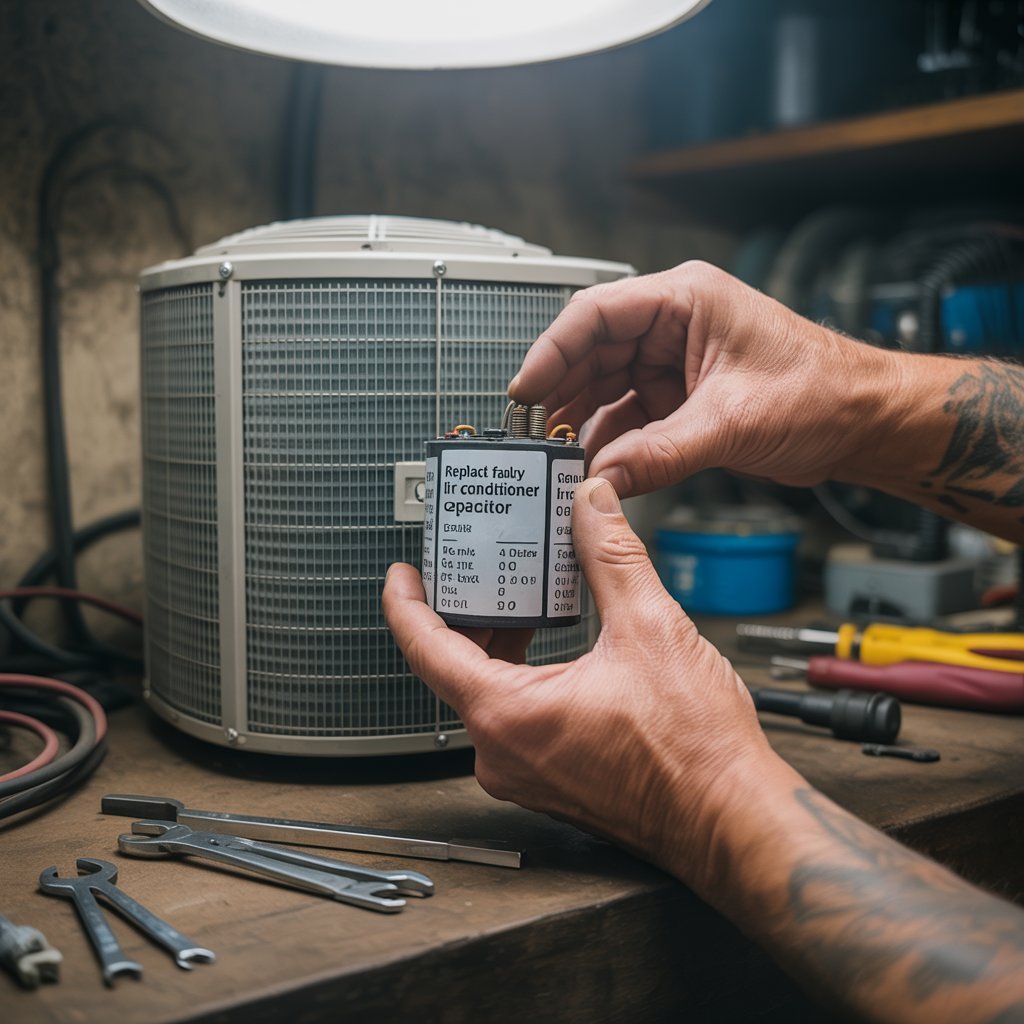
Identifying the root cause helps prevent recurring issues (Source: AZParts)
6. What Does a Warranty Typically Cover for AC Capacitors?
The AC capacitor warranty outlines whether repair or replacement of the capacitor is covered when your air conditioner malfunctions. Understanding this helps avoid unexpected costs.
- Inclusion in HVAC parts warranty: Most manufacturers include the capacitor under the general HVAC parts warranty. However, terms may vary by brand and depend on correct installation.
- Warranty coverage for faulty capacitors: Coverage usually applies if the capacitor fails due to manufacturer defects or early wear—not because of user misuse or external damage.
- Common exclusions from warranty: Capacitor damage caused by power surges, incorrect installation, or lack of maintenance is typically not covered under the warranty terms.
- Protecting your warranty: To maintain eligibility, homeowners should follow HVAC maintenance guidelines and keep all installation and service records.
- Warranty duration: The HVAC parts warranty may last from 1 to 10 years. The length depends on the brand and whether the unit was registered after installation.
- Extended warranty options: Some HVAC installers or third-party providers offer extended protection plans for additional coverage beyond the standard warranty.
- Steps to take if capacitor fails: If a capacitor fails during the warranty period, contact the installer or manufacturer. They can verify coverage and assist with the replacement process under the AC capacitor warranty.
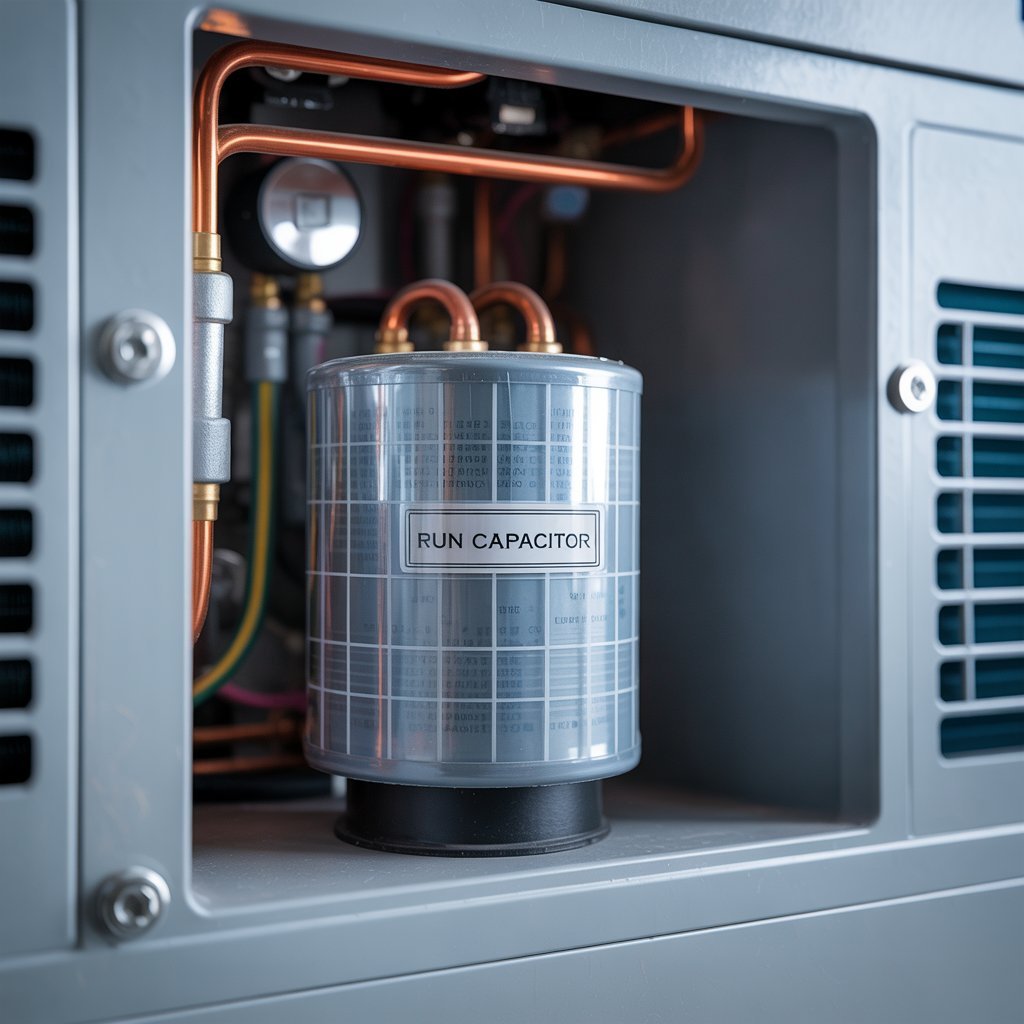
Most manufacturers include the capacitor under the general HVAC parts warranty (Source: AZParts)
7. Should You Repair or Replace a Faulty AC Capacitor?
When comparing AC capacitor repair vs replacement, most HVAC professionals recommend replacement. A faulty capacitor is inexpensive to replace and is more likely to fail again if only repaired. Full replacement ensures better performance and reduces the risk of future breakdowns.
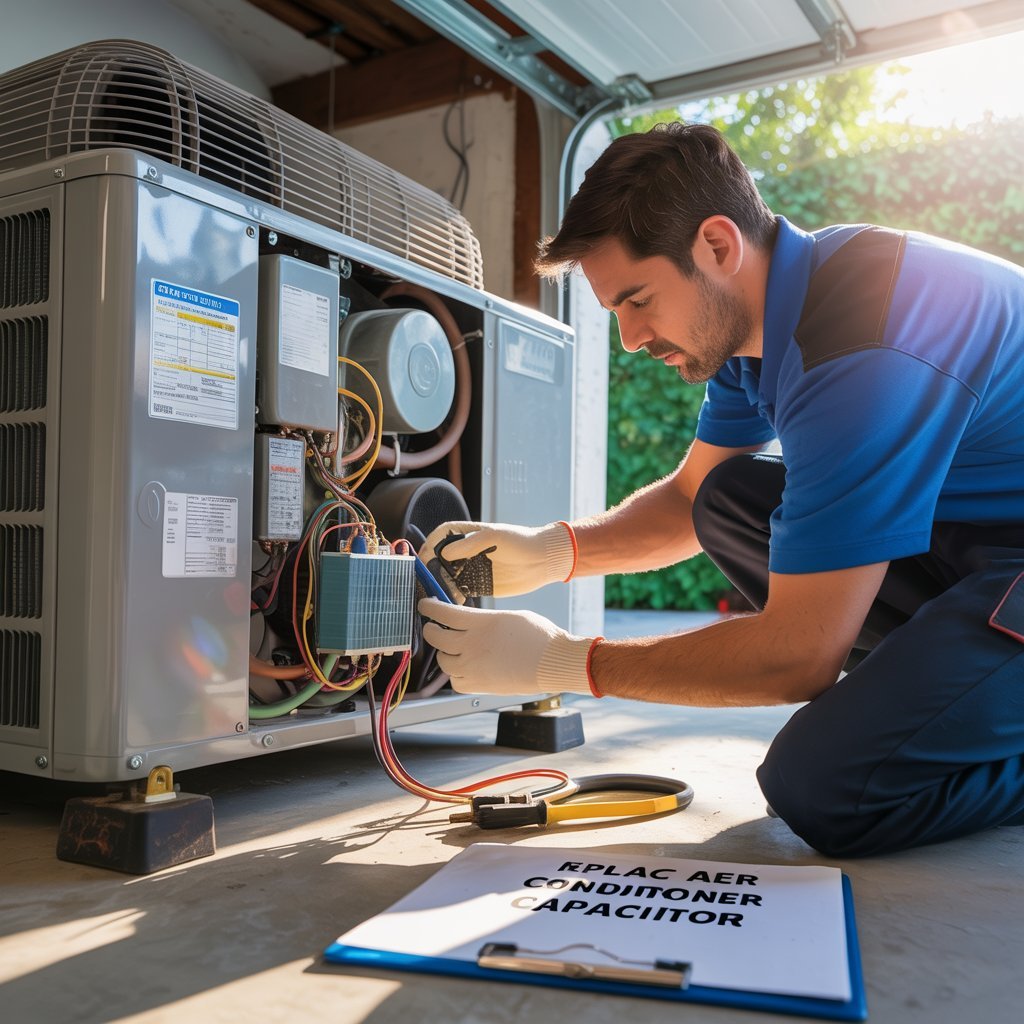
Most HVAC professionals recommend replacement when comparing with AC capacitor repair (Source: AZParts)
As suggested in many HVAC component replacement guides, replacing the capacitor is often the more cost-effective HVAC repair choice. It restores system efficiency, prevents further damage, and helps avoid higher repair costs later on. For reliable replacements, AZParts offers high-quality AC capacitors along with other essential components like covers, piercing valves, and port adapters to support your HVAC system.
8. Frequently Asked Questions About AC Capacitor Lifespan
Is It Safe to Run an Air Conditioner with a Bad Capacitor?
It is not safe to run an air conditioner with a bad capacitor. A faulty capacitor can cause the compressor or fan motor to overheat, which may lead to further system damage or complete failure. Continuing to use the unit in this condition increases the risk of costly repairs and can shorten the lifespan of other HVAC components. If you suspect a capacitor issue, it is best to turn off the system and contact a professional technician.
Why Do Some AC Capacitors Fail More Frequently Than Others?
Several factors can cause some AC capacitors to fail more often than others. Poor-quality manufacturing, extreme temperature exposure, and power surges are common reasons for early failure. In some cases, improper sizing or installation can also lead to reduced performance and a shorter lifespan. Regular maintenance and using high-quality air conditioner parts from trusted suppliers can help extend the life of your AC capacitor.
Knowing how long an air conditioner capacitor lasts helps you plan ahead and avoid sudden breakdowns. By recognizing warning signs early and choosing quality replacement parts, you can ensure your system stays in top shape. For reliable AC capacitors and related HVAC components like piercing valves, covers, and port adapters, shop now at AZParts, your trusted source for high-performance HVAC solutions.
Contact Information:
8 The Green, Ste A, Dover, Delaware 19901-3618, United States
Air conditioner
- 1. What Is the Typical Lifespan of an AC Capacitor in Home HVAC Systems?
- 2. What Factors Influence How Long an AC Capacitor Will Last?
- 3. What Are the Common Signs That Indicate It’s Time to Replace Your AC Capacitor?
- 4. How Can You Extend the Lifespan of Your AC Capacitor?
- 5. How Do You Diagnose and Troubleshoot Problems with AC Capacitors?
- 6. What Does a Warranty Typically Cover for AC Capacitors?
- 7. Should You Repair or Replace a Faulty AC Capacitor?
- 8. Frequently Asked Questions About AC Capacitor Lifespan
Further Reading
Further Reading

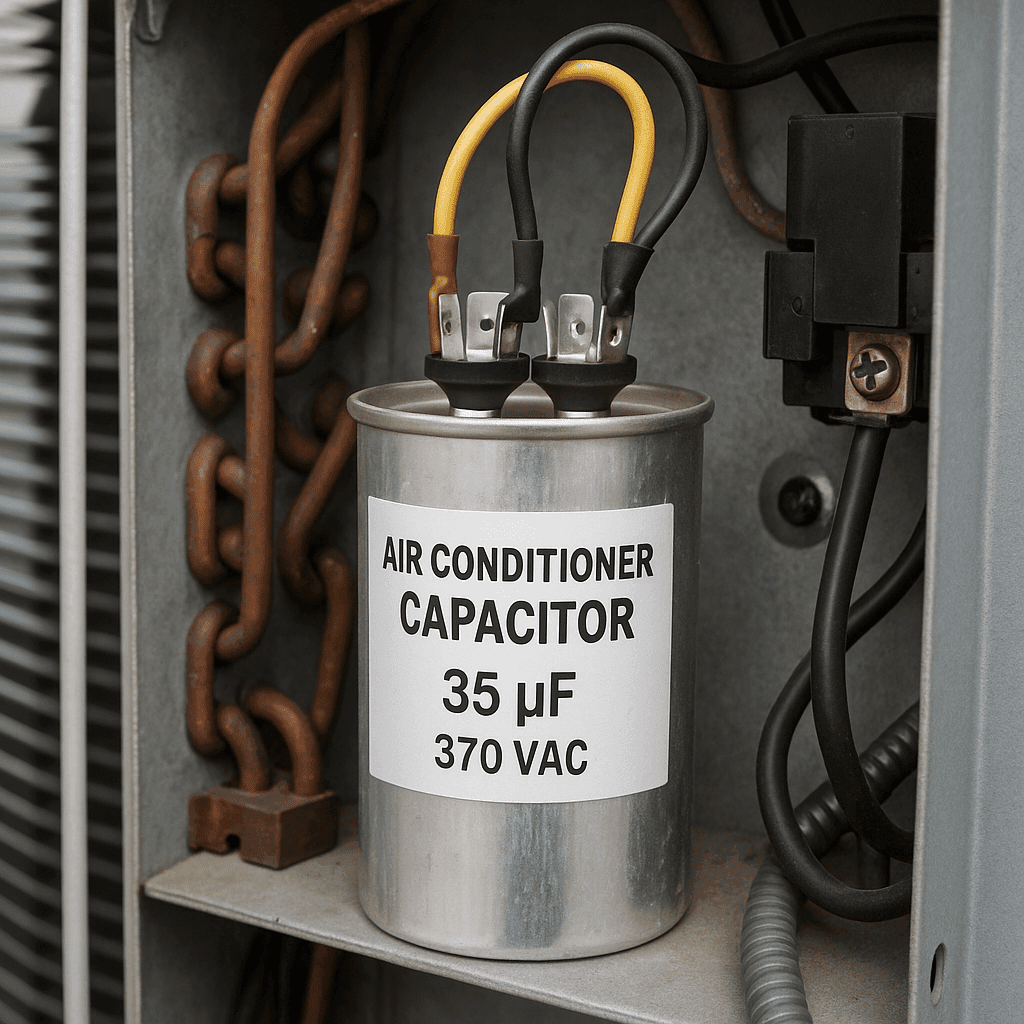
_1751529906.jpg&w=3840&q=75)
